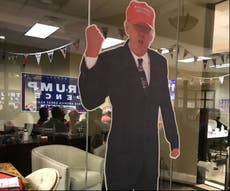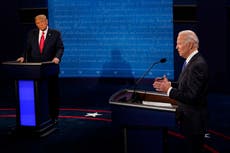Mute button amplified the differences between Trump and Biden
‘I am the least racist person in this room,’ Trump declared at one point during debate
Your support helps us to tell the story
From reproductive rights to climate change to Big Tech, The Independent is on the ground when the story is developing. Whether it's investigating the financials of Elon Musk's pro-Trump PAC or producing our latest documentary, 'The A Word', which shines a light on the American women fighting for reproductive rights, we know how important it is to parse out the facts from the messaging.
At such a critical moment in US history, we need reporters on the ground. Your donation allows us to keep sending journalists to speak to both sides of the story.
The Independent is trusted by Americans across the entire political spectrum. And unlike many other quality news outlets, we choose not to lock Americans out of our reporting and analysis with paywalls. We believe quality journalism should be available to everyone, paid for by those who can afford it.
Your support makes all the difference.It came down to muting the president. That's what it took to stage a reasonably civil debate between President Donald Trump and former vice president Joe Biden. That's not normal and that's nothing to be pleased about. But at least it worked.
Trump was so rude and boorish during the first debate, constantly interrupting Biden, that the Commission on Presidential Debates sought to muzzle the president like a constantly barking dog. The Trump family was too stubborn to wear face masks during the previous debate so this time the commission threatened to forcibly remove anyone who refused to wear one from Belmont University's Curb Event Centre arena. People behaved.
The competitors walked out wearing their team colours. The Republican president wore a bright red tie and his Democratic challenger chose blue. Their spouses entered the hall wearing face masks that matched their dresses: the first lady in black and Jill Biden in a pink floral print. It was all by the book. That alone was worth a sigh of relief.
Instead of a constant stream of interruptions there was a mime's display of emotion: head-nodding, smirking, eye-rolling and wide-eyed grimaces. There were shrugs and hand-flailing and finger jabbing. But there were few instances of one candidate talking over another.
The first topic for discussion, chosen by moderator Kristen Welker of NBC News, was the coronavirus pandemic, which is understandable because it is the poisonous cloud that shows no signs of abating and yet it was the least informative and compelling part of the evening. The question was how each intended to lead the country out of the pandemic.
And their answers and evasions were like a record on repeat. Trump insulted infectious-disease expert Anthony Fauci and then proclaimed him a nice guy. He boasted of his decision to stop some travellers arriving from China. And as more than half the country has seen surges in cases, the president declared, "They will soon be gone."
The president again and again referenced the mysterious "some people," that chorus of ghost experts, advisers and consiglieri to whom he regularly refers but is never willing to identify, to help make his case that the virus will just go away or that young people are practically unaffected. That's what "they say." It's what "people say." Who are these voices that whisper reassuring thoughts in his ear?
Biden's answers were as they always are: Wear masks. Practice social distancing. Deploy rapid testing. Provide schools and businesses with the financial resources to open safely. Nothing sexy; no quick fixes. Just the science.
But even when the subject was the pandemic, Trump was foreshadowing what was to come, which was his onslaught of hazy accusations about Biden's son Hunter and his foreign financial entanglements which have sprouted into Biden family entanglements, which Trump couldn't really explain and didn't really have his facts straight on and which are wholly unproven if not outright disproved.
But still, Trump carried on with this story line through the foreign policy conversation – with a slight detour to fracking – and on through health care where he looks forward to the complete dismantling of the Affordable Care Act but still has yet to pull the big, beautiful Republican health care plan out of his hat.
Biden spent much of this time declaring himself innocent of any foreign wrongdoing and reminding Trump that he was, in fact, not running against Rep. Alexandria Ocasio-Cortez, D-N.Y., or Sen. Bernie Sanders, I-Vt., or any of the Democratic governors who have gotten under Trump's skin. "He thinks he's running against someone else. He's running against Joe Biden," said Joe Biden.
One of the final topics of discussion was race and it was, as always, the most nerve-racking. What white supremacist group will the president refuse to disavow? What racist retweet will he refuse to acknowledge? What horrible thing will the president say and then declare himself misunderstood? Welker asked each candidate to speak directly to black Americans who feel compelled to give their children "the talk" in which they snatch away their innocence and explain how they must interact with police officers with a combination of fear and self-preservation. Do you empathise with those families, Welker asked.
Biden spoke first and looked into the camera as he both outlined his understanding of "the talk" and what it means to have to deliver it. Trump couldn't keep his gaze directed at the viewers. His eyes darted from the moderator to Biden and back again. As the conversation moved on to the Black Lives Matter movement and systemic racism, the president bragged about his funding of historically Black colleges and universities and his support of criminal justice reform. "I am the least racist person in this room," he declared. But what does he say to those who believe he throws fuel on the fires of racial animosity and hatred? "I don't know what to say." And perhaps that was his most honest moment of the night.
In closing, Welker asked each man to imagine his Inauguration Day speech. What might he say to those Americans who didn't vote for him? How would he bind up the country? Trump spoke of money. "Success is going to bring us together," he said. Trump believes that all things are transactional and when enough money is offered, anything, anyone can be bought. Black Americans can buy themselves out of racism. Women can buy themselves gender parity. The country can buy back its disintegrating reputation as humane and just.
Biden's inaugural speech would not ignore the economy. But it would also recognise that some things simply do not have a price. "I'm going to make sure you're represented," he said. "I'm going to choose hope over fear."
The difference between the two candidates was made loud and plain. And in those answers, nothing was muted.
The Washington Post






Join our commenting forum
Join thought-provoking conversations, follow other Independent readers and see their replies
Comments